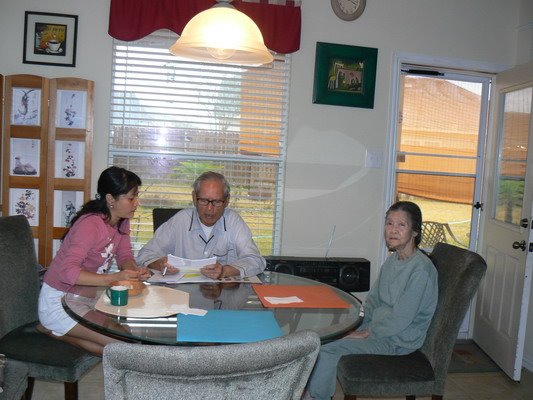THE LEAF
By Khanh Doan
I saw it in the park one yellow late afternoon, when the autumn weather was getting chilly. I was wandering with my father. With a magazine in one hand, I assigned the reading task to one eye of mine, while directing the other to the vast scenery of Nature. The leaf struck my eyes, seemingly at its own will. I first thought the fall was recent, but then I had the feeling that it had lasted for a while. Actually, the leaf was fumbling with its light weight, moving up and down or hovering around, now reluctantly then with more force. It was obviously delaying an expected landing in spite of the still atmosphere of that windless afternoon. I was almost frozen by the sudden perception that the withered leaf had a soul of its own. As I saw my father come near, I called out to him:
“Dad, look at that leaf!”
My dad raised his eyes to the leaf, then quietly moved to it, reached for it, dropped it to his feet, then instantly stepped on it. The leaf was no more but there was no emotion on his face. “Let it reincarnate,” he explained. He had always believed in the Buddhist concept of reincarnation. After that, he continued to stoop to the ground, looking for dry branches. His indifference stunned me. While I perceived life in the leaf, my father simply saw it as something not so different from a dry branch that needed help toward reincarnation. I kept pondering about his brisk gesture in terminating the leaf.
Since then, I began to take interest in falling leaves. Each of them seemed to have a story to confide. Whenever I met someone with a melancholic mind, I instantly visualized them as a falling leaf.
In another late afternoon, I walked along a seaside road with two American friends. One of them just retired from his 40-year-old job to realize that retirement did not fit him. So he got himself a post retirement job (a falling yellow leaf that refused to touch the ground). The other was a young veteran who just came back from the Afghanistan war and was living again as a University student (a torn-out green leaf in the process of self-repair on a University campus).
I was cheerfully matching my steps with those of my friends’ when they suddenly slowed down and lagged behind me. I turned back and saw that they had stopped by a bench. Sitting on it was a lovely American lady. From the way they hugged and made inquiries about each other, I could guess how closely they knew each other. The older of the two friends introduced me to her, then asked me if I was willing to walk the lady home with them before walking together to our cars. I was. Before we left, he showed me the two names engraved on the back of the bench: Andrew and Sean Harvell.
They were both the lady’s sons. I was then informed that the younger had been deployed to Iraq, then died in action in Afghanistan, while his older brother drowned in their hometown of Long Beach after surviving numerous deployments in Afghanistan. Being deeply involved in Buddhism, he was said to have meditated on the beach before his final swim in the ocean.
So, here was a mother remembering her sons on the very bench where their names were engraved. My heart ached for her. She was the yellow leaf destined to outlive two green fallen leaves. This was not uncommon in the history of Vietnam, as related in the folk poem:
The yellow leaf remained on the tree
While, didn’t God know it, the green ones were falling!
As we resumed the walk, I discreetly kept a distance so the three Americans could pursue their unfinished exchanges. In front of her home, she asked if we had “a minute” to spare for tea. Again, my friend asked me if I could. I would love to.
It turned out that the expected “minute” had stretched to be an hour. She spent that hour telling us about her sons. As a single mom, she was the only parent to raise them with her teacher’s salary. Andrew, the younger one, was very popular among his friends because of his exquisite sense of humor. He could easily make people laugh till they were in tears. Yet, in battles, he was said to be a soldier with a lion’s heart. When he lost his life at 26, he was married with two children. His older brother, Sean, was 33 when he passed away. He was then a “single dad” raising his little girl. His mother remembered him as a trouble maker in high school. She was often asked to go meet his teachers, who endlessly complained about his lack of discipline. In battles, though, he was described by his fellow soldiers to be as wild as a forest fire. After being discharged from Air Force Special Operations, he came home to Long Beach and was seen in every corner of his home city on his motorcycle he built from scratch. Wild as he was, the war had spared his life. Yet, the waters off Long Beach did not. When my American friend wrote to me that he drowned down the bluff from his mother’s home, I was absolutely shocked. Couldn’t he swim?
“He was a very good swimmer,” my friend affirmed, “he suffered from seizures as a result of the years of combat and had a seizure while swimming not far from shore.”
Parting with Sean and Andy’s mother, we walked back to our cars, drowned in deep sadness. Her face drew a clear-cut picture of a proud mother dealing with an insurmountable loss. The boys’ father had never been in his son’s lives. Both of her boys were fighting in the most dangerous spots in the world and she remained their home base.
I will always connect the boys’ mother with the bench where the names of her sons are engraved overlooking daily sunsets. And, like Jane, I will remember green leaves, as if they were blown away by the fires of war and the seemingly eternal Pacific Ocean.
Didn’t God know it?
I wondered if she was transformed into a yellow leaf hovering in front of my Zen-influenced father, would he have enough insight to reach for the leaf, drop it to the ground, then tread it under his feet? Would it mean that mother and sons have been reunited in reincarnation?
Feb 26, 2018



No comments:
Post a Comment